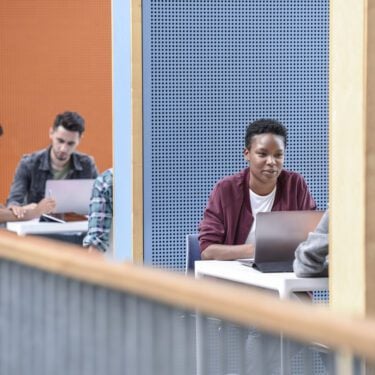Ruth Maisey explores what further research is required to help practitioners and policy makers support the development of numeracy with a focus on the early years and primary phases of education.
There are well established links between strong numeracy and a wide range of other positive outcomes and the Foundation is committed to funding research that helps explore these links.
Our funded projects span all ages, starting from the early years and primary phases, through to participation and quantitative skills post-16. This breadth recognises that early years and primary phases are where the foundations of numeracy are built, and that these essential building blocks underpin later competency. We also recognise the value in considering a broad range of influences on learning, and correspondingly our projects feature a variety of aims and methods.
Nuffield Foundation’s Maths Showcase
Earlier this month, we hosted a showcase of some of our early years and primary maths projects. Chaired by Lynne McClure, Director of Cambridge Mathematics, the showcase gave a platform for researchers to share their findings, with a focus on:
- Factors that influence growth in early numeracy.
- Approaches to teaching.
- Children who have particular difficulty with mathematics.
A panel of respondents, including a teacher, funder and researchers, stimulated a discussion on where this research, and other research developments leave us. What should be next and what else do we need to know to support the development of numeracy?
The showcase gave us an opportunity to consider the themes linking the research we fund in this area and the opportunities for further research.
Future areas of maths research
Home environment
Parents and carers are children’s first educators and so have the potential to play an important role in children’s development. However, more work is required to understand how we can effectively help parents to support their children’s development of numeracy. What home based activities would support numeracy development most effectively? How can parents be encouraged to engage in these activities and do so frequently? To answer these questions we need more evidence on what works.
Ways of measuring the numeracy activities that parents engage in with their children are relatively early in development and have not correlated as expected with children’s maths ability. It may be that more work is required to refine these measures e.g. to better capture more advanced mathematical activities, the true frequency of activities, or the type of numeracy activities that are embedded in everyday tasks.
It was noted that research typically focuses on the home learning environment that children experience in the early years. However, parents have a vital influence beyond the early years and there could be great potential in considering how to shape effective home learning during the primary phase (and beyond). It would be useful for work on the home learning environment to consider parents’ attitudes to maths and the role this plays in the development of children’s skills and perceptions.
Executive function
Executive functions (e.g. attention, self-control, working memory) seem to play an important role in maths development. However, we do not yet have a good cognitive model for how general skills such as executive functions relate to specific skills such as mathematical ability. In particular, research might usefully explore the role of executive function in instances where children have persistent difficulties with mathematics. Attempts to train executive function in isolation seem to have been ineffective. It might therefore be helpful to consider general skills and specific skills in combination, and identify ways of embedding executive function training within maths learning activities.
Professional development
The role of teachers is key. Researchers need to work to demonstrate the value that practitioners can derive from engaging with research and ensure that key findings reach the front line in an accessible manner. There appear to be gaps in the guidance and support available for early years staff to support numeracy, which might usefully be addressed through development of training and teaching resources.
More generally, research has a role to play in supporting the design and delivery of effective professional development. We would like to see wider use of research-informed task design such that the development of teaching resources and interventions builds on learning theory and an evidence-based understanding of good practice.
Supporting children with difficulties
A large proportion of children have persistent mathematics difficulties (e.g. dyscalculia) and yet these difficulties are less recognised than difficulties with reading and literacy (dyslexia). It will take time and research effort to improve understanding and recognition of dyscalculia, even in advance of developing interventions to tackle it.
Likewise, a sizeable proportion of children have anxiety that is specific to mathematics. It would be helpful to better understand the impact of this anxiety with regard to performance, post-16 participation in STEM, and general well-being. It would also be helpful to better understand the triggers of maths anxiety, as well as its trajectory and stability.
In both instances, it would be valuable to develop professional awareness of the difficulties some children experience with mathematics, the risk factors for these difficulties, and the co-morbidity of other conditions. While it is not always helpful to give children a label, better understanding of their difficulties is likely to help identify appropriate types of intervention.
Intervention and evaluation
On that note, it was clear that there is a shortage of well-conducted evaluations of interventions that establish what works. The quality of interventions is vital in order to facilitate synthesis and meta-analysis, and this quality needs to be demonstrable through meeting agreed reporting standards.
Interventions can vary in many ways e.g. in their targeting (children, parents or teachers; girls vs boys; by level of attainment), with regard to their timing (primary vs secondary; prior to the onset of problems as preventative measures or after onset as remediation), in their content, and in their intensity. Research needs to explore what is most effective in which circumstances.
It would also be helpful to develop a better understanding of the active ingredients of effective intervention through greater focus on the mechanisms that bring about change in children’s outcomes. Importantly, we need to fight for the publication of null results to avoid publication bias and ensure that everyone can learn the lessons from what has been shown to be ineffective as well as what has been shown to be effective.
Measurement assessment
Measurement and assessment are central components of a well-conducted evaluation. However, selecting an appropriate assessment can prove challenging since in many instances existing assessments are:
- Unsuitable for the measurement of change over time.
- Focused on diagnosis of problems.
- Subject to floor and ceiling effects in the population of interest.
- Too crude in their ability to measure the constructs of interest.
- Expensive or burdensome (particularly for young children or low attainers who are likely to require individual rather than group assessment).
Consequently, many interventions use bespoke researcher generated assessments which compromises the ability of other researchers to conduct meta-analysis. Valuable work could therefore be undertaken to develop standard outcome measures that could be used more widely to good effect.
However, it was noted that performance is distinct from mastery. This is challenging because while assessment can more easily measure performance, teachers are being asked to focus on mastery and this is fundamentally trickier to measure.
Funding opportunitites
We hope that the material presented at the showcase and associated discussion will stimulate ideas for future research. Moreover, we hope that these ideas will lead to proposals for innovative and rigorous research projects that can improve our understanding of how best to support the development of numeracy through effective policy and practice.
About the author
Ruth is a Programme Head at the Nuffield Foundation. She leads the development and management of the research portfolio relating to early years and primary education, focusing on children’s skills and capabilities, teaching quality, and educational disadvantage.
Prior to joining the Nuffield Foundation, Ruth was a Research Director at NatCen Social Research where she designed and managed evaluations, and other quantitative and mixed-method studies in the fields of children, families and work.

























































